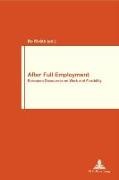Read more
The framework of this book is the structural mass unemployment and social marginalisation that have haunted Europe since the 1970s. Unlike so many previous studies, however, this book does not concentrate on the causes that led to this situation, but focuses on the transformation of our interpretative frameworks and how societies have tried to come to terms with this development. Key questions involved are: How did the paradigmatic shift in the prescriptive language of economists come about when Keynes was abandoned and the neo-liberal rhetoric took over? How did the idea of full employment give way to the flexibility discourse? The contributions assembled in this volume address substantive aspects of the concepts of work and flexibility. Various issues are discussed in a comparative perspective such as labour market organisation, legal regulation (rather than deregulation), and regional co-operation and bargaining over the resources within the European Union. The book is based on a research project at the European University Institute (EUI), Florence, Italy.
List of contents
Contents: Bo Stråth: After Full Employment and the Breakdown of Conventions of Social Responsibility - Peter Wagner: The Exit from Organised Modernity: 'Flexibility' in Social Thought and in Historical Perspective - Bo Stråth: The Concept of Work in the Construction of Community - Noel Whiteside: From Full Employment to Flexibility: Britain and France in Comparison 1960-2000 - Bénédicte Zimmermann: Negotiated Flexibilities: The Case of France and Germany - Christina Garsten/Jan Turtinen: 'Angels' and 'Chameleons': The Cultural Construction of the Flexible Temporary Agency Worker in Sweden and Britain - Laurent Gamet: Towards a Definition of 'Flexibility' in Labour Law - Angelo Pichierri: The (Re-)Emergence of Urban Economies? The Play and the Playwrights - Bo Stråth: The Contours of a European Political Economy: From the Werner Plan to EMU - Bo Stråth/Peter Wagner: Conclusion. After Full Employment: Theoretical and Political Implications.
About the author
The Editor: Bo Stråth is Professor of Contemporary History in the Department of History and Civilisation/Robert Schuman Centre at the European University Institute, Florence. He has published widely on political and economic processes, and his research focuses on modernisation and democratisation processes in Western Europe in a comparative view, with particular reference to labour market organisation.

